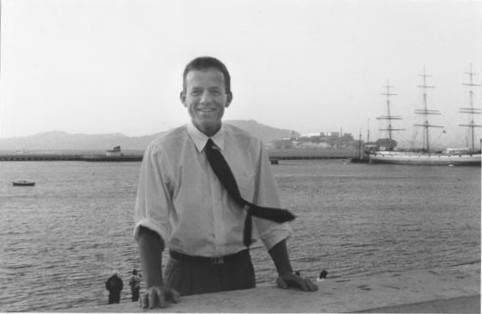Difference between revisions of "Kevin McCarthy"
Rlschlittler (talk | contribs) |
|||
| (8 intermediate revisions by 3 users not shown) | |||
| Line 1: | Line 1: | ||
| + | |||
[[Image:oemccarthy.jpg|center|frame|Kevin McCarthy. San Francisco Superior Court Judge. Photo by Ron Schlittler.]] | [[Image:oemccarthy.jpg|center|frame|Kevin McCarthy. San Francisco Superior Court Judge. Photo by Ron Schlittler.]] | ||
| Line 19: | Line 20: | ||
Elected March 1996 | Elected March 1996 | ||
| − | + | Re-elected 2002 | |
| − | |||
| − | |||
| − | |||
</td> | </td> | ||
| Line 29: | Line 27: | ||
| − | == | + | Of Judge McCarthy's more novel cases was settling a dispute between two fans of Baseball player Barry Bonds. The dispute was over ownership of the ball Bonds hit to mark his 73rd home run of the 2001 season. McCarthy ordered the ball be sold and that they split the proceeds. The ball fetched $515,500. |
| + | |||
| + | |||
| + | == Essay by Kevin McCarthy for ''Out and Elected in the USA'' == | ||
Officially, state judges in California are elected officials with six-year terms. Most judges who retire or are elevated leave office in the middle of their term. A seat left vacant mid term is filled by gubernatorial appointment. As a practical matter, therefore, almost all judges are selected by the governor. | Officially, state judges in California are elected officials with six-year terms. Most judges who retire or are elevated leave office in the middle of their term. A seat left vacant mid term is filled by gubernatorial appointment. As a practical matter, therefore, almost all judges are selected by the governor. | ||
| Line 53: | Line 54: | ||
<div style="text-align: right; direction: ltr; margin-left: 1em;"> | <div style="text-align: right; direction: ltr; margin-left: 1em;"> | ||
| − | Return to [[ | + | Return to [[Out and Elected in the USA: 1974-2004]] index • Go to [[Carole Midgen|next article]] |
</div> | </div> | ||
| − | {{Curated Exhibit|exhibit name and link=[[Out and Elected in the USA | + | For information on a touring exhibit version of ''Out and Elected in the USA: 1974-2004'', contact Ron Schlittler at [mailto:rlschlittler@verizon.net rlschlittler@verizon.net]. |
| + | |||
| + | |||
| + | {{Curated Exhibit|exhibit name and link=[[Out and Elected in the USA: 1974-2004]]|firstname=Ron|lastname=Schlittler}} | ||
Latest revision as of 22:17, 11 April 2009
|
Kevin M. McCarthy Born December 7, 1957 Superior Court Judge San Francisco, California 725,000 constituents |
Career Overview Elected March 1996 Re-elected 2002 |
Of Judge McCarthy's more novel cases was settling a dispute between two fans of Baseball player Barry Bonds. The dispute was over ownership of the ball Bonds hit to mark his 73rd home run of the 2001 season. McCarthy ordered the ball be sold and that they split the proceeds. The ball fetched $515,500.
Essay by Kevin McCarthy for Out and Elected in the USA
Officially, state judges in California are elected officials with six-year terms. Most judges who retire or are elevated leave office in the middle of their term. A seat left vacant mid term is filled by gubernatorial appointment. As a practical matter, therefore, almost all judges are selected by the governor.
From 1982 until the present, there has not been a single open gay or lesbian appointed to the bench in the entire state. At the time of my election, there were 1,555 judges statewide, five of whom were open gays and lesbians. The only route to the bench for us was by election.
I decided to challenge a sitting judge who had recently been appointed by the governor. In my campaign people often asked me why I was running for judge. Some were concerned that judicial elections threaten the independence of the judiciary, a concern that I share. Others were of the opinion that it was impossible to defeat a sitting judge. This was also a concern that I shared, only privately.
I always answered by saying that I considered the question to contain two parts. The first, and most important question, was: what qualified me to be a judge and why did I want the position? The second question was: why did I run instead of seeking appointment. I gave my answers to both questions at every political gathering in this very political city.
When I talked about why I was running, I pointed out that I had no other option. Lesbians and gay men had been unfairly excluded from the appointment process. If I didn't run, I would be acquiescing to the bigotry of the governor and his predecessor, and I could not do that in good conscience.
In the end, the response was overwhelming. I was endorsed by the San Francisco Chronicle, given the highest rating by the Bar Association of San Francisco, and I received the endorsement of most major political figures and organizations including the Democratic Party. In a campaign, which was run out of my home by myself and my former partner David Weldy, I won by a margin of seventy percent to thirty percent.
The lesson, I suppose, is that we derive our power from being open about our lives and confronting bigotry directly. People respect honesty and they will reject discrimination if we give them the opportunity. The greatest weapon possessed by those who seek to oppress us is our own silence.
Return to Out and Elected in the USA: 1974-2004 index • Go to next article
For information on a touring exhibit version of Out and Elected in the USA: 1974-2004, contact Ron Schlittler at rlschlittler@verizon.net.
